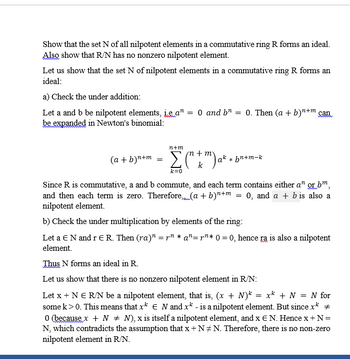
Advanced Engineering Mathematics
10th Edition
ISBN: 9780470458365
Author: Erwin Kreyszig
Publisher: Wiley, John & Sons, Incorporated
expand_more
expand_more
format_list_bulleted
Question
thumb_up100%
Check if the solution is correct. Correct the mistakes

Transcribed Image Text:Show that the set N of all nilpotent elements in a commutative ring R forms an ideal.
Also show that R/N has no nonzero nilpotent element.
Let us show that the set N of nilpotent elements in a commutative ring R forms an
ideal:
a) Check the under addition:
Let a and b be nilpotent elements, iea" = 0 and bn = 0. Then (a + b)+m can
be expanded in Newton's binomial:
(a + b)n+m
=
n+m
Σ(" + m) a² + 1
k=0
ak* bn+m-k
Since R is commutative, a and b commute, and each term contains either a" or bm
and then each term is zero. Therefore,(a + b)n+m = 0, and a + b is also a
nilpotent element.
b) Check the under multiplication by elements of the ring:
Let a EN and r ER. Then (ra)" = r² * a"=rn* 0 = 0, hence ra is also a nilpotent
element.
Thus N forms an ideal in R.
Let us show that there is no nonzero nilpotent element in R/N:
Let x + NE R/N be a nilpotent element, that is, (x + N) = x² + N = N for
some k > 0. This means that x* E N and x* -is a nilpotent element. But since x* *
0 (because x + N + N), x is itself a nilpotent element, and x E N. Hence x + N =
N, which contradicts the assumption that x+N‡N. Therefore, there is no non-zero
nilpotent element in R/N.
Expert Solution
This question has been solved!
Explore an expertly crafted, step-by-step solution for a thorough understanding of key concepts.
Step by stepSolved in 4 steps with 5 images

Knowledge Booster
Similar questions
Recommended textbooks for you
 Advanced Engineering MathematicsAdvanced MathISBN:9780470458365Author:Erwin KreyszigPublisher:Wiley, John & Sons, Incorporated
Advanced Engineering MathematicsAdvanced MathISBN:9780470458365Author:Erwin KreyszigPublisher:Wiley, John & Sons, Incorporated Numerical Methods for EngineersAdvanced MathISBN:9780073397924Author:Steven C. Chapra Dr., Raymond P. CanalePublisher:McGraw-Hill Education
Numerical Methods for EngineersAdvanced MathISBN:9780073397924Author:Steven C. Chapra Dr., Raymond P. CanalePublisher:McGraw-Hill Education Introductory Mathematics for Engineering Applicat...Advanced MathISBN:9781118141809Author:Nathan KlingbeilPublisher:WILEY
Introductory Mathematics for Engineering Applicat...Advanced MathISBN:9781118141809Author:Nathan KlingbeilPublisher:WILEY Mathematics For Machine TechnologyAdvanced MathISBN:9781337798310Author:Peterson, John.Publisher:Cengage Learning,
Mathematics For Machine TechnologyAdvanced MathISBN:9781337798310Author:Peterson, John.Publisher:Cengage Learning,


Advanced Engineering Mathematics
Advanced Math
ISBN:9780470458365
Author:Erwin Kreyszig
Publisher:Wiley, John & Sons, Incorporated

Numerical Methods for Engineers
Advanced Math
ISBN:9780073397924
Author:Steven C. Chapra Dr., Raymond P. Canale
Publisher:McGraw-Hill Education

Introductory Mathematics for Engineering Applicat...
Advanced Math
ISBN:9781118141809
Author:Nathan Klingbeil
Publisher:WILEY

Mathematics For Machine Technology
Advanced Math
ISBN:9781337798310
Author:Peterson, John.
Publisher:Cengage Learning,

